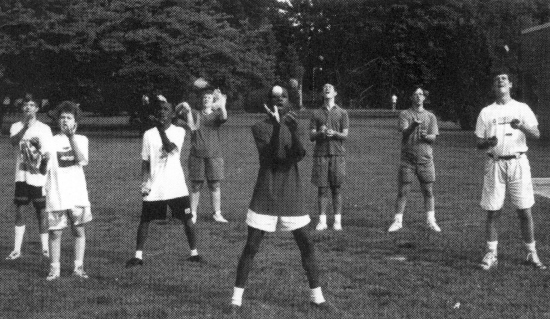|
Henry works in front of the club banner. |

(I-r) Matthew, Jennifer, Henry, Angela, Leonard, Ricky, Eric and Campbell put on a display outside |
Page 25 Spring 1992
|
by Lorraine Slama & Bill Giduz - Photos by Lorraine Slama
The
vague term "exceptional children" applies to a whole range
of emotional, physical and mental infirmities, but juggling is proving
to be a valuable tool to help some of these individuals at a school in
Ridgely, Md., cope with life better.
They
are the 30-40 students who, by being good in academic classes, earn
the privilege to be juggling students of Lorraine Slama twice weekly
at the private, residential Benedictine School for Exceptional
Children.
These
students have a wide range of developmental disabilities and
multi-handicaps, including mild emotional disturbance, controlled
epilepsy, physical handicaps, learning disabilities and mild to
moderate visual and hearing impairments. One student may read at a
fourth grade level while another may not read at all. Some individuals
lack social skills or demonstrate inappropriate behaviors. The wide
range of their abilities means that everything from two scarf juggling
to four ball tricks is taught in the same classroom.
At
the Benedictine School the emphasis is on teaching functional
academics, vocational skills and leisure skills. Lessons here are geared
towards what the handicapped child or youth will need to learn in
order to function in the outside world. Slama said, "We don't
just read books. We work on reading things like labels and bus
schedules - the things it takes to get by during the day. We teach
functional academics that help prepare students for the world of work.
Students do many jobs right in school. There's an industrial contract
center, a greenhouse, a car wash, and students assist in cleaning the
school themselves."
Juggling lessons are part of the curriculum now because learning leisure skills is considered a vital component in their education. Slama explained, "A lot of handicapped kids fail not because they can't hold down a job, but because they don't have anything to do in their spare time. They are fine during the day because they have a job, but at night they don't have anything to do. So teaching them leisure skills is important. Besides juggling, we teach card games, checkers, and especially sportsmanship - how to get along with people if you're losing." |
|
Henry works in front of the club banner. |

(I-r) Matthew, Jennifer, Henry, Angela, Leonard, Ricky, Eric and Campbell put on a display outside |